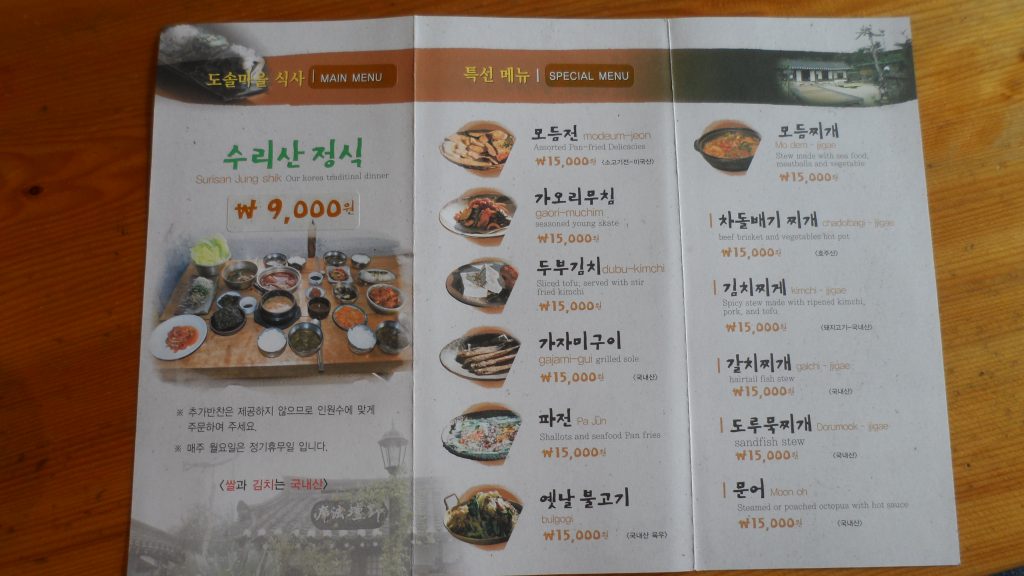Is English widely spoken?
In Seoul, a fair few people can speak English, though probably not as many as you would expect.
Outside Seoul, the likelihood of someone speaking English is a lot less than you might expect. This includes people at Tourist Information offices and booths, some of whom, despite welcoming signs adorning the office in English, pretty much don’t speak English. It did make some situations more complicated than we had anticipated, particularly trying to find somewhere to stay in, for example, Suwon. (It would appear that the Tourist Information office by Suwon rail station has English speakers – we went to about four other Tourist Information places and couldn’t sort our accommodation with the limited English).
Signs are written in English, as are a lot of menus and hotel names.
Road names are usually in English and Korean. This means that travelling around is not as challenging as it could be.
Any Korean/English issues?
Yes, two in particular. We had booked our car from the UK and had chosen Hertz instead of a Korean company for language reasons. Had we collected our car from the airport or Seoul, I expect English would have been spoken. For various reasons, we decided to pick our car up in Cheongju, about an hour and a half by bus from Seoul (to avoid traffic and to set off in the right direction). The car rental form was in Korean, the two members of staff in the small Hertz outlet didn’t speak any English and a woman on the end of the phone who was trying to interpret could barely speak English. It was tense, frustrating and very stressful.
The other issue was finding somewhere to stay in Suwon. We no longer had our car and eventually got to an area within the city walls where we wanted to stay. This was to be our last night in South Korea and we had our cases with us so weren’t prepared to walk too far. We failed to find anyone who could speak English to help us find somewhere. We’d had a very round-the-houses bus journey, were tired, had heavy bags and just wanted to find somewhere to stay before going out for lunch and a walk. Eventually, a woman at the ticket office of the palace, spotting our bags and registering our gestures that we needed somewhere to sleep, escorted us to a hostel. We hadn’t wanted to stay in a dorm or share a bathroom, particularly not for our last night, but that’s what we ended up doing. We silently cursed our inability to speak Korean and reluctantly accepted our lot.
Is it worth learning Korean before you go?
In an ideal world, it would be great to speak and read the language. In reality, with limited time and motivation, I did not learn anything of Korean. I had thought about learning to read Korean but that wasn’t necessary, particularly as reading the Korean on, for example, a menu would not have made me any the wiser about what the dish was. Place names are pretty much all in English anyway.
It is nice to know basics like “thank you” and we did pick that up just by being there. Actually, “thank you” was the only word we picked up and used. Pathetic of us, I know.
Suggestions
We booked some accommodation through Tourist Information places which meant that the booking phone call was done by Koreans in Korean. Ask people to write down the name of places you are going in Korean. This is useful for taxis and for directions. We booked two nights in a Gyeongju hanok via a Tourist Information office near the bus station. They showed us on a map how to drive there and that it was called “Lucky One” but had we not had it written down in Korean, we wouldn’t have found it because it was not written in English. We ended up finding the road, as per the map, then matching the writing that we had written down to the sign, then confirming it with the owner of the hanok. Likewise, this all helped when it came to getting a taxi back to that hanok one night.
